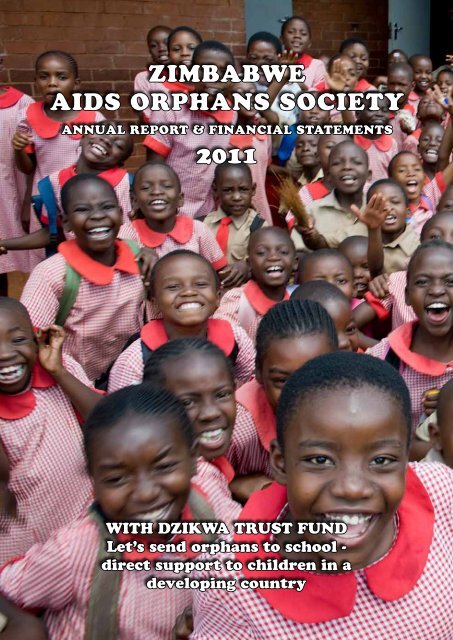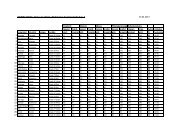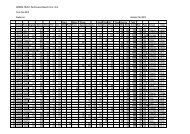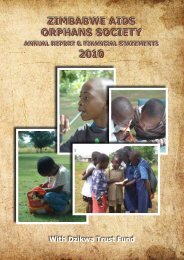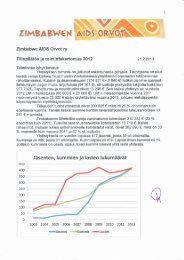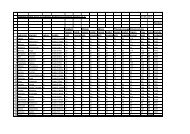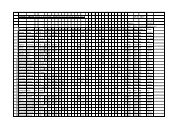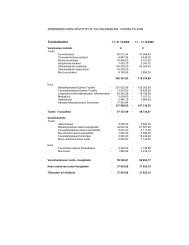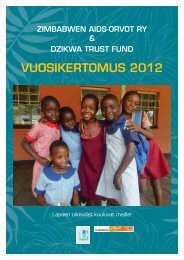ZIMBABWE AIDS ORPHANS SOCIETY - Zimbabwen Aids-Orvot ry
ZIMBABWE AIDS ORPHANS SOCIETY - Zimbabwen Aids-Orvot ry
ZIMBABWE AIDS ORPHANS SOCIETY - Zimbabwen Aids-Orvot ry
- No tags were found...
Create successful ePaper yourself
Turn your PDF publications into a flip-book with our unique Google optimized e-Paper software.
<strong>ZIMBABWE</strong><strong>AIDS</strong> <strong>ORPHANS</strong> <strong>SOCIETY</strong>ANNUAL REPORT & FINANCIAL STATEMENTS2011WITH DZIKWA TRUST FUNDLet’s send orphans to school -direct support to children in adeveloping count<strong>ry</strong>1
CONTENTSGREETINGS FROM THE CHAIRMAN....................................................................................................... 3Key figures over the years...................................................................................................................... 4Zimbabwe <strong>AIDS</strong> Orphans Society........................................................................................................ 4Our Partner, Dzikwa Trust Fund........................................................................................................... 5Zimbabwe <strong>AIDS</strong> Orphans Society............................................................................................................ 6Mission and Aims................................................................................................................................. 6Implementation of the Programme....................................................................................................... 7Our Partner, Dzikwa Trust Fund............................................................................................................... 9Organisation and Supervision.............................................................................................................. 9Financial Status of Dzikwa in 2011.................................................................................................... 11Milestones - 20 years.............................................................................................................................. 13Education Support Programme............................................................................................................. 15Support for Education........................................................................................................................ 15Other Forms of Regular Support........................................................................................................ 17Dzikwa Activity Centre....................................................................................................................... 21Container 2011................................................................................................................................... 23Reforestation and Environmental Education...................................................................................... 23Social Impact..................................................................................................................................... 25Financial Statements.............................................................................................................................. 26Report by the Board 2011.................................................................................................................. 26Operating environment and finances.......................................................................................... 26Financing of activities and expenditure....................................................................................... 26Administration and financial control............................................................................................ 28Publicity and events.................................................................................................................... 29Outlook and challenges ............................................................................................................. 29Income Statement.............................................................................................................................. 31Balance Sheet.................................................................................................................................... 32Notes to Financial Statements........................................................................................................... 33Signatures and Auditor’s Note........................................................................................................... 34Auditor’s Report................................................................................................................................. 35Contact Information................................................................................................................................ 362
EDUCATION WILL HELP THE <strong>ORPHANS</strong>TO DEVELOP THEIR OWN COUNTRY2011 - an eventful yearWork in developing countries poses many challengesbut it also brings many rewards. In this respect, 2011was no exception. On the positive side, as in previousyears, we count the continuing support given by sponsorsand other donors, the children’s enthusiasm andsmiling faces, and the valuable contribution made by ourmany volunteers in both Zimbabwe and Finland. Specificallyin Zimbabwe, the support and initiative of theDzikwa Trust Fund Board and staff are essential to thesuccess of the whole programme. However, serious andcontinuous challenges that we have to face are continuouscost pressures, securing a regular flow of funds, andstrengthening fundraising in Zimbabwe.Our facilities in Zimbabwe have improved beyond measure,as the kitchen/dining block has been in full use fora whole year and the new ICT block was inaugurated inMay 2011. In 2012 we shall have better washrooms forthe children. All that will then be lacking are the officeblock and caretaker’s accommodation.A good example of local cooperation is the reforestationproject, in which Bindura University of Science Educationis supporting the Dzikwa Trust Fund, working welltogether with Helsinki University’s Viikki Tropical ResourcesInstitute (VITRI).School charges continue to rise, pressured by the lowsalaries paid to teachers and the need to maintain andrefurbish school buildings. We have to be prepared todownscale activities. This is never an agreeable task butit is one that we cannot avoid. We have already had tostop supporting Omega group children who were not doingsufficiently well at school and downsize the DzikwaShelter for homeless orphans. We have also had to takechildren out of private schools unless the sponsors agreeto cover the full costs. If fundraising does not producethe desired results, we shall have to make further cuts tovarious support services. Naturally, we hope that donorswill continue to be generous; eve<strong>ry</strong> gift to our Society isa gift to the orphans.A particularly joyful event was the award by Finland’sPresident Tarja Halonen of the Knighthood of the Orderof the White Rose of Finland to Oili Wuolle. The award,announced in the Independence Day honours list, wasgiven in recognition of our 20 years of work for the benefitof the orphans. I had the great honour to present themedal to Oili in Janua<strong>ry</strong>.We shall celebrate our 20th anniversa<strong>ry</strong> by continuingour efforts to improve the lives of orphans in Zimbabwe.There is no end to the work in sight, and we thereforecall on each one of you to continue your generosity andsupport.Peter RehnströmChairman of the Boardpeter.rehnström@tfif.fiOur financial framework is now in place for the next threeyears: Finland’s Minist<strong>ry</strong> for Foreign Affairs has awardeda development aid grant, albeit smaller than previously,for another three years, with the reminder that this is thelast time our project will qualify for the grant. We musttherefore put even greater effort into developing the ownershipof Dzikwa’s operations in Zimbabwe. Our localpartner must get Zimbabwean organisations and privateindividuals to support the programme with donations,both cash and in kind, and through volunteer work.Bindura’s Vice Chancellor, Professor E. Mwenje,visits the reforestation areaOili receives her award3
50,00002005 2006 2007 2008 2009 2010 2011OUR PARTNER, DZIKWATRUST FUNDKuvio 3The relative increase in other expensesin 2011 arose largely from DzikwaActivity Centre maintenance costs anddepreciation.Total funds raised and value of donations in kindFinnish Minist<strong>ry</strong> for Foreign Affairs grantsFunds used by the Dzikwa Trust Fund for support operations:300,000250,000200,000Funds used by Dzikwa for orphans' supportprogrammeEuro150,000100,00050,00002005 2006 2007 2008 2009 2010 2011Education-related costs & other activity costsOther expensesFunds used by Dzikwa for construction of the orphans’ Activity Centre:Kuvio 4Investment in building Dzikwa Centre€275 647Kuvio 4Euro180,000160,000140,000120,000100,00080,00060,00040,00020,00002006 2007 2008 2009 2010 2011Investment in building Dzikwa CentreFunds used €275 for building 647 investmentKuvio 5Two factors in particular have affectedthe trend in average expenditure:• In 2006 the number of children Kuvio 5grewdramatically and there was a clear decreasein costs per child• This was followed by a markedchange in the children’s age Kuvio distribution. 6:In the early years, the majority of childrenin the programme were at prima<strong>ry</strong>school but over the years the number inseconda<strong>ry</strong> school and tertia<strong>ry</strong> educationhas increased and their education expensesare higher than those of prima<strong>ry</strong>school children.Kuvio 6:180,000Dzikwa's average expenditure / child160,000800 140,000700120,000100,000600 80,00060,000500 40,000400 20,00003002006 2007 2008 2009 2010 2011200Trend in Dzikwa’s average expenditureFunds used for buildingper child:investment100EuroEuroEuro02005 2006 2007 2008 2009 2010 2011800Total expenditure/ child700600500160,000 400300140,000200120,000100100,000080,00060,000 Total expenditure/ child40,00020,000160,00005Dzikwa's average expenditure / childEducation related costs & other activity costs/ childMeals served by Dzikwa2005 2006 2007 2008 2009 2010 2011Education related costs & other activity costs/ childMeals served by Dzikwa
Our strategy is to help diligent children who would otherwisebe marginalised through lack of education. Ourprogramme is based in Dzivarasekwa, a poor townshipwith a population of 100,000 on the outskirts of Zimbabwe’scapital, Harare. We support the children over thelong term in their own community. The total number ofchildren is kept at around 400, of whom 65% are girls.Girls ready for schoolof Dzikwa Society, was established in 2009 and is currentlybeing registered as a Private Volunteer Organisation(PVO), with the task of promoting local fund raisingand attracting sponsors and donors.Principles of Society’s fundraisingThe Society finances its activities by collecting membershipfees, sponsorship payments and other dedicatedsupport payments, as well as donations in kind and incash. The cost of administration in Finland is coveredby membership fees. Support for the children’s welfare,e.g. their daily meals, health care, sport and recreation,is acquired as earmarked donations received from regulardonors and by making specific needs known in thesocial media. Sponsors and supporters are encouragedto make celebration donations and to leave legacies tothe Society in their wills. Small-scale sales of crafts areheld in connection with various events.Since 2006, the Society has received project grants fromFinland’s Minist<strong>ry</strong> for Foreign Affairs under its NGO DevelopmentCooperation Programme.Values we believe in are• Honesty• Openness and a sense of responsibility• Making an effort & taking initiative• Help for the less fortunate• Care for one’s own environmentOur programme has neither political nor religious affiliation.The Society is committed to the ethical principles ofdevelopment cooperation implemented with grants fromthe Finnish Government.IMPLEMENTATION OF THE PROGRAMMEFrom support for one boy to key player inDzivarasekwaThe education support programme was launched on theinitiative of the Finnish founders in 1992. Ten years later,in 2002, the Dzikwa Trust Fund (Dzikwa) was set up inZimbabwe to plan, steer, implement and monitor supportactivities. A new civil society organisation, the FriendsDzikwa has received a grant from the Embassy of Finlandin Lusaka under the Fund for Local Co-operation.A written cooperation agreement has been concludedbetween the Society and Dzikwa. The Society sendsdonated funds in full to Dzikwa for the purposes setout in the cooperation agreement. The financing of andfundraising for investment projects such as building arekept separate from other activities. Special projects (e.g.reforestation) have their own budget and are monitoredseparately from support activities. Neither the Societynor Dzikwa takes long-terms loans to finance its programmeactivities or building investment.Dzikwa has also received grants from the Embassy ofFinland in Lusaka and in Maputo under the Fund for LocalCo-operation.Going to school in Zimbabwe – no compulso<strong>ry</strong>educationZimbabwe has a good school network but going to schoolcosts money. Compulso<strong>ry</strong> school charges are:• tuition fees, computer lesson fees• exam fees, fees for practicals• levies for school maintenance and toppingup teachers’ salaries• levies for books, practicals, building funds andschool buses• school uniforms and shoesMost of the children in the programme attend governmentand municipal day schools in Dzivarasekwa. Sevenof these are prima<strong>ry</strong> schools and two are seconda<strong>ry</strong>schools. A small number of Dzikwa children attend aprivate seconda<strong>ry</strong> day school in Dzivarasekwa and twoseconda<strong>ry</strong> level boarding schools outside Harare.Technology holds no problems for us7
OUR PARTNER, DZIKWA TRUST FUNDORGANISATION AND SUPERVISIONOperative team in the fieldThe Dzikwa Trust Fund has a small and effective fieldorganisation of paid employees in Zimbabwe who seeto the practical running of the programme. In 2011, thenumber of employees was reduced: one Field Officer,the Shelter Matron and the Kitchen Team Leader all leftat the end of the year. At the end of 2011, the key membersof the operative team consisted of Assan Mponda,Accountant; Levita Chenera, Field Officer; PriscillaTakawira, who is responsible for procurement, for boardingschool and tertia<strong>ry</strong> students, for students on placements,as well as for overseeing the Dzikwa kitchen; andNyaradzai Matiza, ICT trainer, who is also responsiblefor the Dzikwa Shelter. Dzikwa also has nine other regularemployees: five cooks, two Activity Centre guards, agardener and a forest<strong>ry</strong> mentor/ worker. As part of thelocal field organisation we have three environmentalmanagement students and one social sciences studentfrom Bindura University of Science Education. They willbe with Dzikwa on a study-related attachment for ninemonths.The Finnish founders and Programme Directors, SeppoAinamo and Oili Wuolle, oversee and guide operations,administration and financial reporting, and network withstakeholders. They spend about half the year in the fieldin Zimbabwe.Direct, effective actionDzikwa pays school-related charges and purchases suppliesdirect; no money is given to the children or theirguardians. The majority of new children are accepted forthe programme on the recommendation of their schools.The Dzikwa team is in close contact with the childrenand knows each one of them well. Dzikwa collects andanalyses their school reports three times a year, at theend of each term.The Activity Centre is busyConstruction of the children’s ve<strong>ry</strong> own centre, which gotunder way with the purchase of a site in 2006, has madegood progress. Today, the Dzikwa Activity Centre on RujekoStreet, right in the middle of the township, is thefocal point of support operations and is a ve<strong>ry</strong> popularmeeting place for Dzikwa children. The Activity Centrecomprises a large kitchen/dining hall, an ICT block, a ballcourt, a bore-hole with water tanks, a vegetable gardenand a small office/storage building.Good practice in management and supervisionPractical field work is coordinated at the weekly operativemeeting, which is attended by key staff members,the Finnish directors and, when necessa<strong>ry</strong>, volunteersand students on study-related attachments. The keystaff members report on activities and events for the pastweek and discuss the outlook in their areas of responsibilityaccording to a fixed agenda. The meeting decideson future actions and compiles a budget for normal, recurringand smaller cash needs. The meeting also analy-Seppo meets new children9
Dzikwa’s total expenditure by main areas:Dzikwa's expenditure by main areas 2011: €283 2202%4%4%4%Education-related costsOther activity costs6%Dzikwa's expenditure by main areas Vehicle 2011: costs €283 2206%2%4%4%4%46%Administration costsEducation-related costsPersonnel costsOther activity costsDzikwa Centre maintenance & other costs6%6%28%46%Vehicle costsRe-forestation projectAdministration costsDepreciationPersonnel costsEducation-related costs rose by 14.5% on the previous year. The increase Dzikwa is Centre attributed maintenance mainly to & other expenditure costs onschool uniforms, school books, stationa<strong>ry</strong> and other supplies, extra lessons and ICT tuition. Other activity costsinclude children’s nutrition and the vegetable garden, health care, sport, Re-forestation culture & recreation, project the Dzikwa Shelter,children’s travel 28% expenses, acquisition of missing birth certificates, and the lone mothers’ handicraft project.Depreciation1%Education-related expenditure 2011: €130 6703%10%Breakdown of education-related expenditure:School charges19%1%10%Education-related expenditure 2011: €130 670School uniforms and sportswearText books and accessories3%School charges67%Extra lessonsSchool uniforms and sportswear19%ICT tuitionText books and accessories67%Extra lessonsICT tuitionThe income statement before depreciation for financial year 2011 showed a deficit of €6,304. After depreciation, thedeficit was €17,727 (a deficit of €6,826 in 2010). Dzikwa recorded one exceptional expense of €1,269 under otherexpenses in 2011, which was caused by misuse of cash funds by a member of staff. This person is no longer employedby Dzikwa. The Society's funding by source in 2011, total €325 6121% 1% 2%12Minist<strong>ry</strong> for Foreign Affairs grants
MILESTONES - 20 YEARSMILESTONES - 20 YEARS• 1992 First boy to school with Seppo Ainamo’s support• 1996 Oili Wuolle joins the project: children’s numbersdouble from 18 to 36• 2002 Dzikwa Trust Fund established in Harare• 2003 Zimbabwe <strong>AIDS</strong> Orphans Society established inFinland• 2005 Dzikwa Shelter set up for 30 children The Embassyof Finland in Maputo, Mozambique, grants DzikwaTrust Fund €21,000 to buy food and computers. FinnishMinist<strong>ry</strong> for Foreign Affairs (MFA) project grant for 2006-2008 totalling €180,000• 2006 First container to Harare. Number of children approaches300.• 2007 First sponsor get-together. First student on placementfrom Zimbabwe and first volunteer from Finland• 2007 First prize in series for small societies and foundationsin PwC Finland ‘Open Report 2007’ competition forstakeholders and financial reports.• 2008 Second container from Finland. Dzikwa’s reforestationprogramme started. MFA project grant for 2009-2011 totalling €280,000• 2009 Third container. Number of children reaches 400.Dzikwa cultural group perform at HIFA (Harare InternationalFestival of the Arts) for the first time.• 2010 Fourth container. First student on placement fromFinland. Honourable mention in series for small societiesand foundations in PwC Finland ‘Open Report 2010’competition for stakeholders and financial reports.• 2010 Two Dzikwa students receive scholarships toSouth African universities. MFA grant for Dzikwa reforestationprogramme for 2011-2013 totalling €68,000• 2011 Fifth container. First student on placement fromSweden in Dzikwa. Rental agreement signed with HarareCity to lease 60 hectares; reforestation project incooperation with Bindura and Helsinki (VITRI) universities• MFA project grant for 2012-2014, totalling €150,000• 2011 Four new Dzikwa students awarded scholarshipsto South African universities• 2012 Five students on placement from Zimbabwe andfour from FinlandStep by step, the dream of creating an ActivityCentre comes true• 2006 Site bought with support given by Scottish RoyalArch Masons• 2007 Plans and permits; bounda<strong>ry</strong> wall constructedaround site• 2008 Ball court foundation; security guard’s hut; boreholedrilled with funds from Australian Embassy• 2009 Storage building; electricity, mains water anddrains connected; 10,000 litre water tanks installed;completion of bounda<strong>ry</strong> wall; vegetable garden; grantof €80,000 from MFA towards building Activity Centrekitchen block• 2010 May, ball court ready• 2010 November, new kitchen/dining hall ready• 2010 Finnish Embassy in Lusaka, Zambia, gives€54,100 in support of Dzikwa’s ICT Centre• 2011 May, ICT Centre ready; buildings’ external wallspainted; solar panels installed to heat water for thekitchen, with gift from Australian Embassy• 2012 Plans for children’s washroomsDzikwa’s well equipped Activity Centreserves the children in many ways13
FINANCIAL YEAR 2011SUPPORT FOR EDUCATIONIn 2011, programme support focused as before on twogroups of children, Alpha and Omega. Eve<strong>ry</strong> child in theAlpha group has a dedicated sponsor and receives fullDzikwa support for education and welfare. The childrenin the Omega group do not satisfy Dzikwa’s academiccriteria and are selected on social grounds from amongthe most needy children in the township. They do not receivefull support from Dzikwa and do not have a personalsponsor. In 2012, Dzikwa no longer has the resourcesto support children in this group.Number and distribution of childrenLevelIII/2011GirlsIII/2011BoysIII /2011TotalI/2012GirlsI/2012BoysI /2012TotalPrima<strong>ry</strong> Grades 1-7 142 79 221 149 72 221Junior Seconda<strong>ry</strong>72 48 120 75 49 124Forms 1-4Senior Seconda<strong>ry</strong>12 11 23 18 13 31Forms 5-6Schools for Disabled 3 1 4 2 2Schools Total 229 139 368 244 134 378Tertia<strong>ry</strong> Education 12 12 24 15 13 28Total 241 151 392 259 147 406Thirty-one of the seconda<strong>ry</strong> school pupils (15 girls and 16boys) were at two boarding schools about 250 km southof Harare (Dewure and Gutu High Schools). Dzikwa cansend a child to boarding school with the consent and supportof the sponsor if the guardian’s situation and homeconditions are particularly difficult and if the child is doingsufficiently well at school (average grade at least 70%).In the course of the year, six pupils left the programme forreasons of their own, e.g. moving elsewhere or marriage.At the end of the year, shortage of funds forced us to stopsupporting children without sponsors who were receivingsupport on purely social grounds (Omega group).The proportion of girls in the programme has remainedat around 65%.Final exams taken in 2011Exam Number, 2010 Number, 2011 Prediction, 2012Grade 7 29 28 34O-Level 39 40 33A-Level 6 11 16Total 74 79 83In Zimbabwe, children usually start school at age 6 andthe prima<strong>ry</strong> level (Grades 1-7) lasts seven years. Juniorseconda<strong>ry</strong> (Forms 1-4, O-level) lasts four years and seniorseconda<strong>ry</strong> (Forms 5-6, A-level) two years.A good half of Dzikwa pupils who sat for their O-levels in2011 gained high enough marks to continue to A-levels.The maximum number of points in A-levels is 15; Dzikwa’stwo best boys gained 12 points and two best girls11 points. A total of 40 Dzikwa pupils were made prefectsduring the year (25 in 2011).Analysis of school reports at the end of 2011 revealedthat only half of all sponsored children (Alpha group) satisfiedwell the minimum requirement for school perfor-mance. The proportion has risen to 60% in the first term2012. In the lowest classes at prima<strong>ry</strong> level, almost 90%of children easily achieved the required standard.Dzikwa is making eve<strong>ry</strong> effort to establish, and moderate,the factors interfering with pupils’ school performance.The children are offered extra guidance with homeworkand assignments. All age groups need more group studyand peer support. Our volunteers and students on attachmentsare seeking to determine the reasons for poorperformance together with the children themselves. Thechildren are being encouraged to spend more time studying.One of Dzikwa’s challenges is to motivate guardiansto become involved with and support their children’s education.15
Numbers live a life of their ownIT instruction in progressIT instruction moves into its own facilitiesIn March-April, computer-expert Markku taught basiccomputer skills to 20 prima<strong>ry</strong> and 15 seconda<strong>ry</strong> (O- andA-level) pupils. In May, Dzikwa started up regular IT instructionfor seconda<strong>ry</strong> (O- and A-level) and tertia<strong>ry</strong>-levelstudents in its own facilities in the Activity Centre. In 2012instruction has also started for prima<strong>ry</strong> pupils.A prize for eve<strong>ry</strong>one doing extra lessonsAmbassador Sinikka Antila inaugurated the ICT Centre: witnesseswere Dzikwa’s Chairman Stephen Chifunyise, OldMutual’s Managing Director Jonas Mushosho, EducationSupervisor Mr K.J. Kagoro and Seppo AinamoAn effort is made to give O-level pupils guidance inchoice of subjects for A-levels, as they have little ideaof the subjects required for various careers. On 5 OctoberDzikwa arranged a career-guidance session for 50O- and A-level pupils. They were given advice about thecourses of study and qualifications needed for the professionsof business manager, HR manager, lawyer andcommunications engineer. VolunteersMaya and Virva set up workshops fora group of 14 older pupils in study andmind-mapping techniques and in completingCVs.16
OTHER FORMS OF REGULAR SUPPORTIn poor areas like Dzivarasekwa, children frequently donot have access to sufficient food, health care, protectionor safe rest, play and leisure.A hung<strong>ry</strong> child does not learnThe daily hot meal provided by Dzikwa is the main mealof the day for many of Dzivarasekwa’s children. Themeal has been provided since 2003, and since November2010 it has been prepared and eaten in Dzikwa’s Kuvio 4 wellequipped Activity Centre. Lunch is served on weekdaysfrom 10 am to 2.30 pm and at weekends from 11 am to1.30 pm. Deprived children not supported by Dzikwa arealso welcome to enjoy the meal.The daily serving consists of sadza, a traditional dishmade of maize mealie-meal, with beef or minced meat,kapenta fish or beans, and onions, tomatoes and greens.Once a month the children are given chicken and rice.Dzikwa received several donations of food in the courseof the year. Among the donors were: Carswell Meats;Colcom Foods; the Embassy of Kuwait; First Class Bake<strong>ry</strong>;German Agro Action; a blind Dzivarasekwa chickenfarmer called Chipo; and Tynwald Plot Vegetable Supplier.Euro180,000160,000140,000120,000100,00080,00060,00040,00020,0000Investment in building Dzikwa Centre€275 6472006 2007 2008 2009 2010 2011Funds used for building investmentKuvio 5Euro8007006005004003002001000Dzikwa's average expenditure / child2005 2006 2007 2008 2009 2010 2011Total expenditure/ childEducation related costs & other activity costs/ childKuvio 6:160,000140,000120,000100,00080,00060,00040,00020,0000Meals served by Dzikwa2005 2006 2007 2008 2009 2010 2011Basic health care is neededDzikwa seeks to give the children good support in theirbasic health care and in the event of acute sickness. In2011 Dzikwa children paid 159 visits to health clinics orthe doctor (140 visits in 2010). The local private clinic runby Dr Chagonda and the dental clinic run by the MethodistChurch continued to give Dzikwa a 50% discount.In 2012, Finnish trainees in the health care sector willbe compiling a health record for all children in the programme.Eve<strong>ry</strong>one enjoys being on stageSinging, dancing and music instruction continued underthe direction of the Pamuzinda Group of Artists, financedby our German sponsors, Harare e.V. At the beginningof May the dazzling Harare International Festival of Arts(HIFA) was a huge success once again, especially forDzikwa’s 30-strong Marimba & Dancers group, who on29 April performed at the Youth Zone for the third timerunning. Altogether 120 Dzikwa children were among thespectators and another 70 were given free tickets to otherperformances. Take a look at HIFA at: www.hifa.co.zw17
Dzikwa’s Marimba & Dancers in fullBasic swing health at HIFA care is neededDzikwa seeks to give the children good support in theirbasic health care and in the event of acute sickness. In2011 Dzikwa children paid 159 visits to health clinics orthe doctor (140 visits in 2010). The local private clinic runby Dr Chagonda and the dental clinic run by the MethodistChurch continued to give Dzikwa a 50% discount.In 2012, Finnish trainees in the health care sector willbe compiling a health record for all children in the programme.Eve<strong>ry</strong>one enjoys being on stageSinging, dancing and music instruction continued underthe direction of the Pamuzinda Group of Artists, financedby our German sponsors, Harare e.V. At the beginningGo on ... catch!of May the dazzling Harare International Festival of Arts(HIFA) was a huge success once again, especially forDzikwa’s 30-strong Marimba & Dancers group, who on29 April performed at the Youth Zone for the third timerunning. Altogether 120 Dzikwa children were among thespectators and another 70 were given free tickets to otherperformances. Take a look at HIFA at: www.hifa.co.zwDzikwa’s cultural group put on 10 shows in Dzivarasekwaduring the year. The children enjoyed the theatre asin previous years and in 2011, over 300 attended productionsat either the REPS Theatre or the Theatre in thePark. On 22 September, 92 children went to the CombinedSenior Schools’ Concert in Harare. Six of Dzikwa’sdancers performed at Pamuzinda’s own festival. A totalof 325 youngsters enjoyed the eight DVD film shows puton in the Activity Centre dining hall.18Six Dzikwa seconda<strong>ry</strong> school pupils received prizes atthe speech competition organised by Junior ChamberInternational Harare on 8 October.Sports Day and ball gamesThe University of Zimbabwe sports ground was a livelyplace on 4 September when 290 children crowded onto it for Dzikwa’s annual sports day. All competitors tookpart in two field and two track events. Other events wererelay races and tug-of-war. Guest of honour was themarketing manager of the Karina Yarn Facto<strong>ry</strong>.The Activity Centre ball court was in demand for basketball, volley ball and tennis. On 4 November HarareSports Club’s tennis coach came to give the children freetennis lessons. Dzikwa’s soccer team took part in a numberof local competitions.
Volunteers are a regular occurrence at DzikwaIn 2011 we had 13 volunteers helping at Dzikwa. One ofthem was a young Zimbabwean student studying economicsin the USA and one was a Swedish student ofdevelopment studies at Gothenburg University. Othervolunteers were from Finland. In addition to them, fourFinnish sponsors came on short visits. The volunteershelped in numerous ways - giving extra lessons, planningthe ICT Centre, helping with financial administration,updating the database, tracking down missing birthcertificates, analysing school reports, unloading the containerand distributing the contents, cleaning the ActivityCentre site and giving environmental education.The birth certificate - a critical documentLack of a birth certificate has been a problem for nearly90 children, as without a birth certificate children cannotusually take their Grade 7 exams and cannot enrol inseconda<strong>ry</strong> school. In May 2011, Dzikwa set up a specialproject with a team of volunteer lawyers from Kantor &Immerman to systematically chart the children’s currentsituation. A part-time employee then acquired missingdocuments and the outcome was 16 birth certificates. Astudent from Bindura University of Science Education iscontinuing this work in 2012.Maya, our Swedish student on attachment,with her new friendsShrinking numbers at Dzikwa ShelterAs requested by Harare’s social welfare authorities,Dzikwa has reduced the number of children living in theShelter from 30 to 17. One room is now occupied by volunteersand students on attachments.Maths the Finnish way20
DZIKWA ACTIVITY CENTREA quiet periodThings have been quiet on the building front since theopening of Dzikwa’s own ICT Centre on 2 May. Guests ofhonour on that occasion, which marked the culminationof the main building projects, were Ambassador SinikkaAntila from the Finnish Embassy in Lusaka, who awardeda grant for the project. The ICT classroom is in dailyuse but the Internet access point cannot be opened tothe public until Dzivarasekwa gets an ADSL connection.Landline connections to the Centre have been installedin readiness.Important events in the Activity Centre were:• children’s assembly on 22 Februa<strong>ry</strong>• visit by representatives of the Scottish Royal ArchMasons on 28 Februa<strong>ry</strong>• Seppo’s birthday on 14 May• visit by UNICEF’S representative in Zimbabwe,Dr Peter Salama, and his family on 24 September• visit by our German sponsors from Munich on 1November• children’s Christmas party on 3 December• hobby groups, other visits and farewell parties forsponsors and volunteers• reception of container and distribution of donations• environmental eventsIn 2011, the Activity Centre area was smartened up withplants and grass. Security was improved by installing analarm system and employing a second guard. The ActivityCentre is now the focal point for Dzikwa and thechildren in the programme. As well as meals and IT instruction,there are facilities for extra lessons, clubs andhobbies, Dzikwa’s own events and children’s meetings,the libra<strong>ry</strong> and storage. The ball court is in great demand,and water from our bore-hole is used by local residents,sometimes hundreds of people a day, as well as our childrenand Dzikwa’s own employees.UNICEF’S representative in Zimbabwe,Dr Peter Salama, brought great t-shirtsCar<strong>ry</strong>ing water is women’s workWeaving friendship bracelets21
Rehearsals are often held on theActivity Centre terraceThe next project at the Activity Centre is to build decentwashrooms for the children. We hope to get that donein early 2012. The cost will be around €20,000 and wehave been promised two-thirds of this sum by UNICEFZimbabwe through the Catholic Relief Services.The source of the €60,000 needed to finance the buildingof the caretaker’s accommodation and an office for fieldworkers is still a question mark.Volunteer/sponsor Saara helps Father Christmasto hand out presents to all22
CONTAINER 2011The fifth container to be sent to Dzikwa with the Society’ssupport arrived safely in August. Sending a containerfrom Finland calls for a major effort and is onlyjustified if the value of the contents is so high that Dzikwacan then cut down on other expenses. The most valuablegoods sent out in 2011 were 60 second-hand PCsin prime condition donated by the Bank of Finland. Largeamounts of other useful goods were also donated. Morethan 400 children and 80 families living near the ActivityCentre received something from the container. TwoFinnish volunteers, Helka and Heikki, expertly organisedand supervised the distribution. In addition, computersor other supplies were given to schools, including twoschools for the disabled, Rujeko Street health centre, StGiles Medical Rehabilitation Centre, Sports Day helpers,and tertia<strong>ry</strong> students.REFORESTATION AND ENVIRONMENTALEDUCATIONDzikwa’s key environmental project made progress in2011. A cooperation agreement with Bindura Universityof Science Education was signed on 9 November andthe university has sent three students of forest<strong>ry</strong> and environmentalscience to do a period of practical trainingwith Dzikwa. The plans for two students from the Universityof Helsinki’s Viikki Tropical Resources Institute(VITRI) to do their study-related placements with Dzikwain 2012 were finalised. An agreement to rent 60 hectaresfrom Harare City Council proceeded to the finalisationstage and was signed at the beginning of 2012. It is foreseeablethat the land area allocated to the project willincrease to 90 hectares. increase to 90 hectares.The container couldn’t have been packed withoutTimo, Cesare and TapioDZ people get through a lot of firewoodEve<strong>ry</strong> child received an armful of useful thingsOur reforestation mentor, Mr Mhakayakora,and some Dzikwa friends23
At the beginning of December, Dzikwa children joinedforces to plant just under 3,000 seedlings. Two of theBindura students are working full time for the reforestationproject and one is involved in other activities connectedwith environmental education, protection and developmentof the children’s own local environment, suchas the Dzikwa Activity Centre.Munashe and Lele plant seedlingsChildren register for planting with OiliOther environmental education focused on improvingthe vegetable garden and making it more productive,planting shrubs etc, creating a system for sorting andcomposting waste, and setting up an environmental clubfor the children. Together with the volunteers, Dzikwaarranged environmental happenings and events at theActivity Centre.Hanna from Finland plants her own treeCar<strong>ry</strong>ing seedlings is no problem for these little Dzikwa girls24
SOCIAL IMPACTDzikwa is well known and trusted in Dzivarasekwa. Theprogramme has been able to accept all poor orphansfrom the township whose school report average is atleast 60% and who can thus be expected to completetheir education successfully. The children’s guardians,schools, officials in the education sector and other playersare all familiar with Dzikwa and its work with orphans.In 2011, UNICEF Zimbabwe has become more closelyinvolved with Dzikwa’s activities. Dzikwa participated inHarare’s district level Stakeholders’ Meeting organisedby the Provincial Education Director, Mr C. E. Mazula;Dzikwa’s stakeholder reporting was considered exempla<strong>ry</strong>.The Activity Centre with its events and activities is Dzikwa’svisible presence in the township. The opening of thewell-equipped ICT Centre has increased the orphans’ accessto information technology. The project has receivedmuch favourable publicity, e.g. a half-page article in Zimbabwe’sleading daily newspaper. The same newspaperpublished the remarkable sto<strong>ry</strong> of a Dzikwa youngsterwho for many years served as head of his family whilealso going to school. Local residents are invited to join inclean-up days in the surroundings. During prolonged water-cutsthey can also fetch water from the Activity Centreborehole. One particularly busy week-end, as many as400 people were queuing up for water.Thanks to the reforestation project, our cooperation withHarare City Council has further intensified. Dzikwa isnow setting up partnerships with locally well establishedand respected environmental bodies. The sustainabledevelopment of an extensive stretch of degraded landrequires the involvement of local residents throughoutplanning and actual implementation. The impact of theproject is underlined by the close cooperation with bothBindura University of Science Education and the Universityof Helsinki’s Viikki Tropical Resources Institute(VITRI). Dzikwa is becoming increasingly popular withZimbabwean and Finnish students keen to do volunteerwork and study-related attachments.Dzikwa’s own cultural group performed on a number ofoccasions in Harare, which works wonders for the orphans’ability and self-esteem.In 2012 Dzikwa will be commissioning an external evaluationof its performance and of the sustainability of thesupport programme.25
<strong>ZIMBABWE</strong> <strong>AIDS</strong> <strong>ORPHANS</strong> <strong>SOCIETY</strong>’SFINANCIAL STATEMENTSREPORT BY THE BOARD 2011Operating environment and economicdevelopmentThe Society’s operations remained stable in 2011 despitethe prolonged uncertainty of the European economicsituation. The financial statements show that theSociety’s financing was based on well-established channelsand grants from development cooperation fundsawarded by Finland’s Minist<strong>ry</strong> for Foreign Affairs (MFA).Disappointingly, €7,000 in payments such as membershipfees and sponsorship payments were not received,partly because the Society does not yet have an automatedbilling system in place. The operating year’s totalfunding, including donations in kind, came to €325,612,which was close to the budgeted sum of €326,000. TheSociety transferred approximately €14,000 over the originalbudget to Dzikwa’ support activities to cover higherthan expected education related costs.The Society’s balance sheet total was €42,607.50.The results for the financial year came to a surplus of€21,354.86. Capital at the end of the financial period totalled€9,844.78.Financing of activities and expenditureThe Society’s total income for 2011 (ordina<strong>ry</strong> activities+ fundraising) in moneta<strong>ry</strong> terms came to €313,681,and donations in kind to €11,931, representing the totalvalue of goods in the container. Regular sponsorshippayments as a proportion of operating income increasedto 39% from 27% the previous year. Of the sponsorshippayments, 90% came from sponsors in Finland and theremainder from Germany, England, Scotland, Swedenand Belgium. There are significant clusters of sponsorsamong the staff of the Bank of Finland and the FinancialSuperviso<strong>ry</strong> Authority (FIN-FSA), the Odd Fellowsorganisation, freemasons in both Finland and Scotland,the staff of the Crown Agents in England and the GermanHarare e.V. Society.In addition to sponsorship payments, donations earmarkedfor the children’s welfare totalled €17,452, representinga good 5% of all income. The majority of thededicated donations went to the food fund, accountingfor €10,227, all of which came from Finland.General donations worth €20,181 came from Finlandand worth €7,433 from other countries. The Bank of Finlandcelebrated its bicentena<strong>ry</strong> in 2011 and in honourof this made a donation of €12,000. In deciding on thedonation, the Bank took into account the personal sponsorshippayments made to the Zimbabwe <strong>AIDS</strong> OrphansSociety by the Bank’s and FIN-FSA’s staff. Other general,large donations were €4,000 from the Scottish RoyalArch Masons, €1,730 from members of the Odd Fellowsorganisation, and €1,000 from an individual sponsor inJoensuu, Finland.The Society’s fundraising is separated from its ordina<strong>ry</strong>activities. Fundraising proceeds totalled €64,617 in 2011.Private individuals’ contributions to fundraising amountedto €46,686 in cash and to €11,931 in donations inkind. In addition to membership fees, the main donationscame from birthday and similar anniversaries as well asspeakers’ fees. Altogether eight Finnish donors raised€11,890 as gifts received on their anniversaries. Onelarge supporter was a Finn, resident in Germany, whodonated €20,739 in speaker’s fees. In addition, smallishdonations were received from a number of events,handicraft sales and collection boxes. Of the fundraisingincome, €12,391 was earmarked for the building project.No legacies were left to the Society in the reporting year.The Minist<strong>ry</strong> for Foreign Affairs (MFA) project grant toorphans’ support activities totalled €90,000 and is recordedas expenses for ordina<strong>ry</strong> activities. In contrast,€6,000 support received for reforestation for 2011 hasbeen recorded as fundraising income, as it is not directsupport for orphans’ education and general welfare andis separately earmarked.Cash donations accounted for 67% of all funding (54%in 2010), grants from Finnish Government developmentcooperation funds for 29% (44% in 2010) and donationsin kind for 4% (2% in 2010).26
Financing of activities in 2011The Society's funding by source in 2011, total €325 6121% 1% 2%4%3%Minist<strong>ry</strong> for Foreign Affairs grantsSponsorship payments8%30%Special fundraising revenue, incl. salesGeneral donations12%Donations in kind to Dzikwa CentreDonations for foodDonations for health careDonations for Dzikwa Shelter39%Membership feesFinnish Government grants to the Society from development cooperation fundsGrant type 2006 2007 2008 2009 2010 2011 2012 2013 20141) MFA grant for €60,000 €60,000 €60,000 €100,000 €90,000 €90,000 €60,000 €50,000 €40,000orphans' educationand general welfaresupport programme2) MFA grant for€80,000kitchen construction3) MFA grant for international€15,000awarenesseducation in Finland4) Reforestation grant €6,000 €42,000 €20,000Total awarded €60,000 €60,000 €60,000 €115,000 €170,000 €96,000 €102,000 €70,000 €40,000The bulk of the funds collected by the Society are sent infull to the Dzikwa Trust Fund. Direct support transferredto Dzikwa totalled €272,500, of which over 93% wenton the children’s educational and welfare expenses; theremainder went on the Activity Centre and reforestationprojects. In addition, donations in kind valued at €11,931were allocated to the Dzikwa Activity Centre.Administrative expenses totalled €7,180, accounting forless than 3% of total expenses. Administrative and travelexpenses for key Finnish persons combined amountedto approximately 5% of expenditure.27
34<strong>ZIMBABWE</strong> <strong>AIDS</strong> <strong>ORPHANS</strong> <strong>SOCIETY</strong> FINANCIAL STATEMENTS 2011(MFA = Minist<strong>ry</strong> for Foreign Affairs in Finland)Income statement 1.1-31.12.2011 1.1-31.12.2010Ordina<strong>ry</strong> activities € €IncomeSponsorship payments 125,927.83 106,989.06Support to health care 3,980.00 8,375.00Support to nutrition 10,227.25 12,580.00Support to Dzikwa Shelter 3,245.25 5,680.75MFA grant to orphans' education & general welfare 90,000.00 90,000.00MFA grant to building project - 80,000.00General support 27,614.20 15,532.55260,994.53 319,157.36ExpensesCash donations to Dzikwa for ordina<strong>ry</strong> activities - 254,109.00 - 235,040.00Cash donations to building project - 12,391.00 - 126,387.00Donations in kind to Dzikwa Activity Centre - 11,931.00 - 9,590.00Cash donations to other projects - 6,000.00 - 10,573.00Travel expenses - 7,595.32 - 8,143.52Administrative expenses - 7,179.68 - 4,170.62- 299,206.00 - 393,904.14Surplus/Deficit - 38,211.47 - 74,746.78FundraisingIncomeMembership fees 7,290.00 6,020.00MFA grant to reforestation project 6,000.00 -Cash donations to building project 12,391.00 23,096.21Donations in kind to Activity Centre building project 11,931.00 9,590.00Sales income 1,281.80 4,623.20Other fundraising income 25,723.53 28,619.21ExpensesTransport of goods to Zimbabwe - 4,922.00 - 5,195.12Other expenses - 129.00 - 4,663.77Fundraising surplus/deficit 59,566.33 62,089.73Surplus/deficit for the financial year 21,354.86 - 12,657.0531
36NOTES Tilinpäätöksen ON PREPARING laatimista koskevat THE FINANCIAL liitetiedot STATEMENTSIncome Tuloslaskelma: statementRahastotalletus on arvostettu nimellisarvoon. Kontin tavaralahjoitukset on arvostettu tullinCash tilastoarvon and bank mukaisesti. assets have been valued at nominal value. The donated goods in thecontainer have been valued according to customs statistics.Varsinaisen toiminnanActual tuotot: operational incomeSuomi muut maat yhteensäFinland Other countries Totalkummimaksut 113438,00 12489,83 125927,83Sponsorship payments 113,438.00 12,489.83 125,927.83terveydenhoitoavustukset 1580,00 2400,00 3980,00Support ruoka-avustukset to health care 10227,25 1,580.00 2,400.00 10227,253,980.00Support suojakotiavustukset to nutrition 3065,25 10,227.25 180,00 3245,2510,227.25Support muut avustukset to Dzikwa Shelter 20181,30 3,065.25 7432,90180.00 27614,203,245.25Other Yhteensä fundraising ilman revenue UM:tukea 148491,80 20,181.30 22502,73 7,432.90 170994,5327,614.20Total excluding Minist<strong>ry</strong> for 86,8 % 13,2 % 100,00 %Foreign Affairs grant 148,491.80 22,502.73 170,994.53Varsinaisen toiminnan kulut86.8% 13.2% 100.00%Varoja siirrettiin Dzikwalle yhteensä 254 109,00 + 12 391,00 + 6 000 = 272 500,00 euroa.Operational Ulkoministeriön expenses metsähankkeelle kohdistamasta tuesta 28 000 euroa, 6 000 euroa kirjattiinvuodelle 2011 ja loput 22 000 euroa siirrettiin UM:n luvalla vuodelle 2012.A Matkakulut total of €254,109.00 koostuvat + hankevastuuhenkilöiden 12,391.00 + 6,000.00 = lentokuluista €272 500.00 ja ajokorvauksista was transferred Suomessa. toDzikwa Hallintokulut, cover jotka operational ovat 2,4 expenses. % kaikista kuluista, The Minist<strong>ry</strong> koostuvat for Foreign atk-, tiedotus-, Affairs (MFA) tietoliikenne-, grantpankki- ja toimistokuluista.allocated to the reforestation project amounted to €28,000. Of this, €6,000.00 wasrecorded Tase: to 2011 and the remaining €22,000.00 was transferred, with MFA approval,to be used in 2012.VastaavaaTravel Pitkäaikaisiin expenses saamisiin comprise on the kirjattu Finnish 10 000,00 key persons’ euron rahastotalletus flight costs and Nordean driving Kasvu expenses Ain korkorahastoon. Finland. Lyhytaikaisiin saamisiin on kirjattu muina saamisina vuonna 2011ulkomailta tehty lahjoitus, 10 000,00 euroa, joka ei ollut saapunut yhdistyksen tilille ennenAdministrative 31.12.2011. Loppuosa, expenses, 977,41 at 2.4% euroa of total on saaminen expenditure, Seppo comprised Ainamolta IT, ja ADP Oili bank Wuolteelta,expensesjoka on maksettuand officeyhdistykselleexpenses.alkuvuonna 2012 .BalanceVastattavaasheetSaadut ennakot 32 404,35 euroa koostuvat seuraavista eristä:Assets UM:n metsähankkeelle vuonna 2011 myönnetyn tuen vuodelle 2012 siirretty osuus22 000,00 euroa.Long term Kummien assets include vuodelle €10,000.00 2012 kuuluvat investment kummimaksut in Nordea 10 404,35 Kasvu euroa. A money marketfund. Short-term assets have been recorded as other assets and include a €10,000donation from abroad in 2011, which did not arrive in the Society's account before 31December 2011. The remainder, €977.41, is a receivable from Seppo Ainamo andOili Wuolle, paid to the Society at the beginning of 2012.LiabilitiesDeferred income, €32,404.35 is composed of: That portion of MFA grant for the reforestation project, €22,000.00, which waspaid up in 2011 and deferred to be used in 2012. Sponsorship payments paid in advance for 2012 to the amount of €10,404.35.33
List of ledgers, receipt types and retention methodsBalance sheet ledger separately boundJournal and general ledger as computer listsThree paper receipt types:account statements of starting and ending balances, bank receipts and memo receiptsSigatures of the BoardHelsinki, 4 April 2012Peter RehnströmEsa OjanenMerja GrandellOili WuollePetri MeroTerhi TiikkainenAuditor’s noteAn Auditor’s report has today been issued on the audit performedHelsinki, 14 April 2012Risto Ekholm, Authorised AccountantAudit Polar Oy34
CONTACT INFORMATIONWebsite: www.zim-orvot.orgFacebook: www.facebook.com/zimbabwenaidsorvotSponsorship payments in 2012:Grades 1–7 Children in Gov. day schools €270Forms 1–6 Children in Gov. day schools €370Forms 1–6 Children in Pinewood High €600Forms 1–6 Children in boarding school €700Dzikwa Shelter €300Children in special schools €450Students in tertia<strong>ry</strong> education, minimum €700Payments can be made to:Zimbabwe <strong>AIDS</strong> Orphans Society, Nordea Bank Finland, EUR account number: 174530-61640 andIBAN: FI7617453000061640. SWIFT: NDEAFIHH.Reference number for sponsorship payment, when paying in Finland, is 1012.Dzikwa Trust Fund, Stanbic Bank Zimbabwe Ltd., EUR account number:7022084391701 and USD account number: 0240084391701, SWIFT:SBICZWHX.In Finland:Zimbabwe <strong>AIDS</strong> Orphans SocietyPurotie 3 A 33FI-00380 HELSINKITel: +358 50 322 6000 /Oili Wuolle or+358 40 721 1405/ Seppo AinamoEmail: zim-orvot@hotmail.com orseppo.ainamo@kolumbus.fiIn Zimbabwe:Dzikwa Trust FundPO Box HG 916HighlandsHARARE, <strong>ZIMBABWE</strong>Tel: +263 772 210 855/ Seppo Ainamo or+263 772 403 485/Oili WuolleEmail: dzikwatrust@africaonline.co.zwEspoon Painovoima OyCover photo Mari Waegelein36


